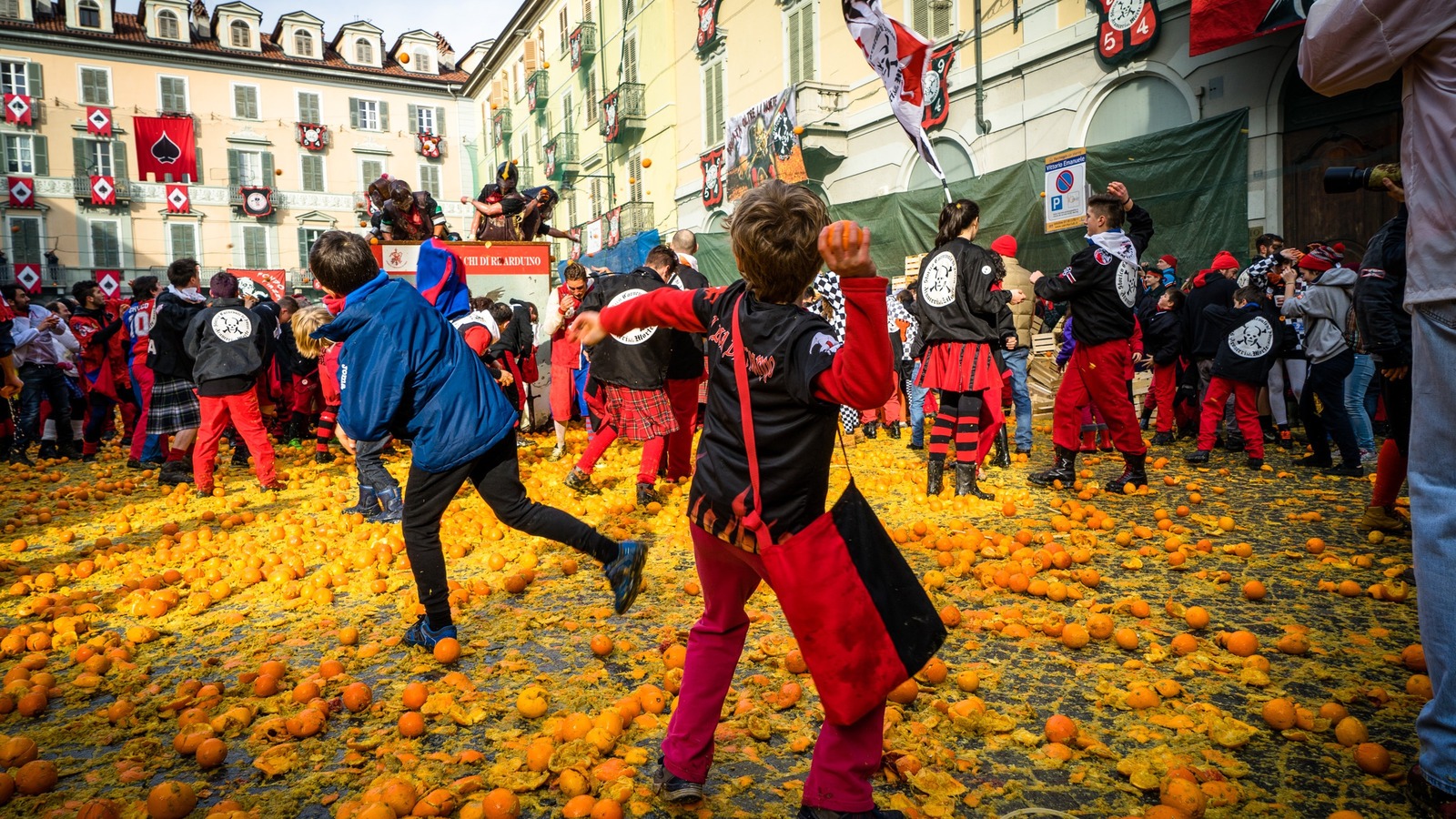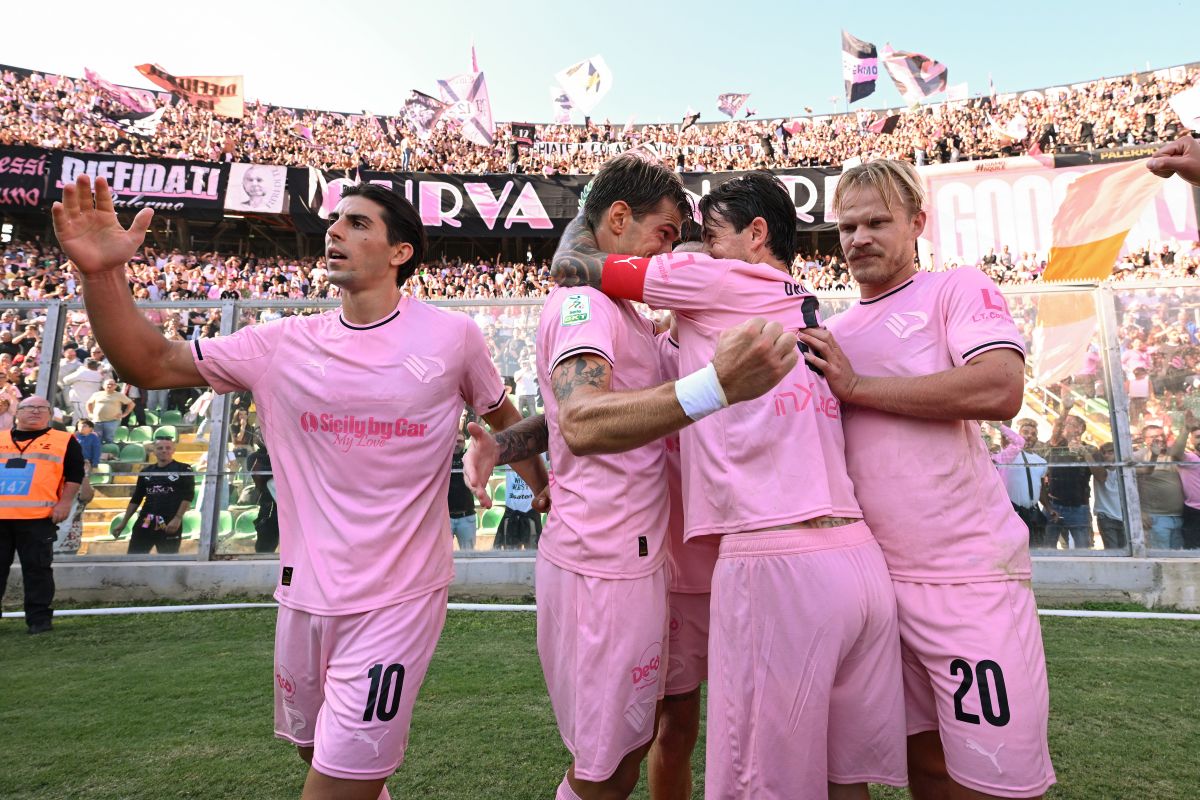
Vince Grella Relishing the Challenge of Getting Catania Back to Serie A ‘Where They Belong’
By Emmet Gates
Vincenzo ‘Vince’ Grella strode into the offices at Catania’s Stadio Angelo Massimino assured.
Decked out in a smart blazer and jeans, an outfit topped with sunglasses and a cigar, Grella looked the picture of a man who had been out in the sun, or just living everyday life in Sicily.
As a player in the 1990s and 2000s, Grella was a midfielder of distinction. The Australian has been one of the few Serie A success stories from Down Under.
Six years were spent on Empoli’s books (with loan spells at Ternana) before he signed for Parma in the summer of 2004. Grella spent three years at the heart of the Gialloblu midfield before a season at Torino.
And after a decade in calcio he made the move to England in the summer of 2008, signing for Blackburn.
Now back in Italy as vice-president of Catania, Grella sat down with Destination Calcio on a pleasant spring day to discuss the club’s ambitions, his involvement in the project and the challenge of taking the island’s second-biggest club back to where many feel they belong.
He had no previous dealings with Catania, a mainstay in Serie A in the latter half of the 2000s and into the 2010s before their relegation at the end of 2013-14 sent them spiralling.
They went down again at the end of the following Serie B season after then-owner Antonio Pulvirenti was found guilty of match-fixing, and since then various owners have come and gone, deals have fallen through and at one point the club was declared insolvent and stripped of its professional status by the FIGC.
It was within the rubble that a new version of Catania was formed. Rosario Pelligra bought them in the summer of 2022, and Grella explains how he got involved, ultimately becoming vice president.
“It started two-and-a-half years ago with an introduction made by Mark Bresciano to a very strong, ambitious entrepreneur from Melbourne, Mr Rosario Pelligra, who expressed interest in buying a club in Italy,” says Grella.

Pelligra has Sicilian roots, his mother being a Catania native before emigrating to Australia. But Grella admits this was unknown to him at the time.
Those roots can perhaps go some way in explaining how the deal happened so quickly.
“In the space of 48 hours, our president decided to take over the club, with a passion and drive that in my career in football I’ve very rarely seen,” says Grella.
“His investment of time behind the project, this guy is flying backwards and forwards from Australia to Italy like it was Melbourne to Sydney, and I’ve never heard him complain once.”
Pelligra no doubt hopes his enthusiasm and commitment behind the scenes will rub off on those around him.
“His number one interest and focus is that the team does well and that the club is able to engage with the people and recreate the enthusiasm that was lost after the bankruptcy,” says Grella.
Part of this is to invest in the youth sector and start initiatives with local communities. Catania has a population of just under 300,000 and is Italy’s 10th biggest city.
If you include the metropolitan area, that figures soars to over a million people. It is a number that should be tapped into.
Moreover, Grella has laid down the gauntlet, stating that if Catania fail to bring a single youth product through to the first team, he is willing to buy a local journalist dinner every Friday night for a year.
“The club is always spreading and expanding in the community,” says 45-year-old Grella. “If you were to see the amount of initiatives Catania is doing, it’s probably more than the club has done in the last 10 years.
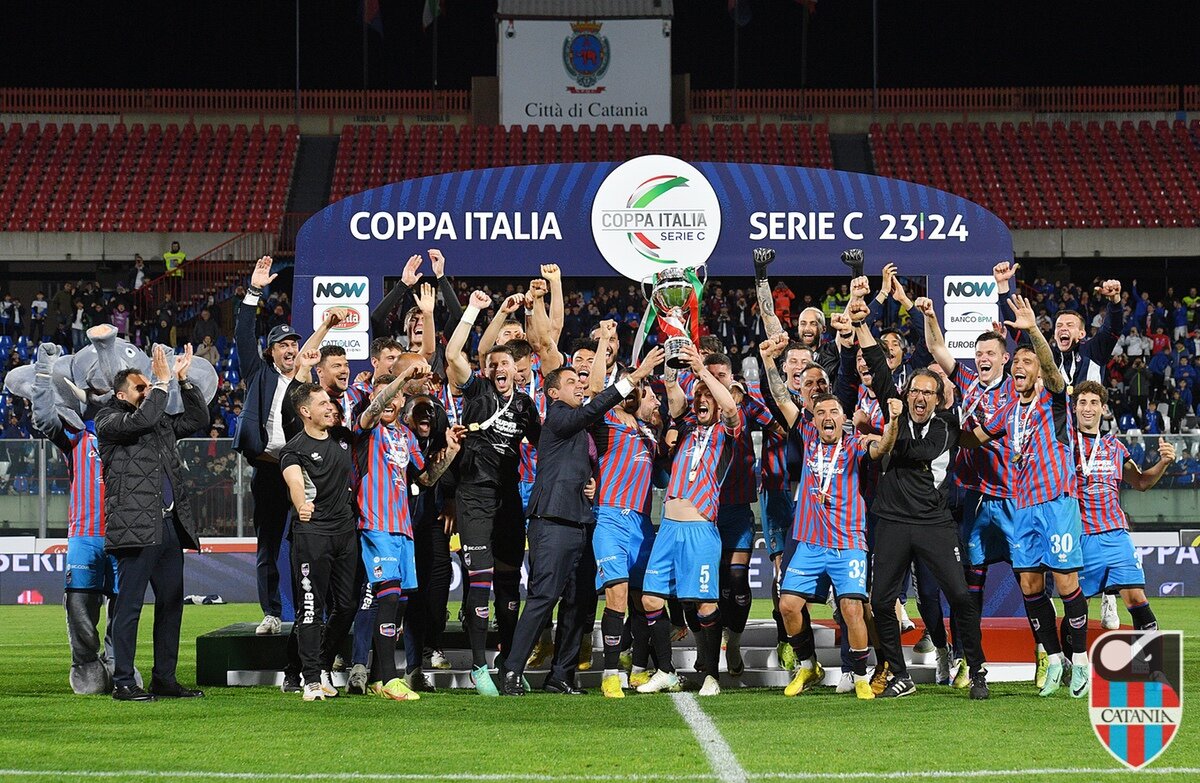
“We have identified over 5,000 young footballers through our affiliation programme. But we’re unfortunately a little bit behind in regards to infrastructure.”
Such was Catania’s troubles in the midst of bankruptcy that they lost everything, including the use of their old name Catania Calcio and the training ground, Torre del Grifo.
“Ground zero would be an understatement,” says Grella.
Therefore, he admits that Pelligra has had to be selective over where investments have gone, and for the time being establishing a youth academy is somewhat down the list of priorities.
“There’s no doubt that when we have the infrastructure in place, we know we will be able to provide a platform to build our own players in-house,” he admits.
In the short-to-medium term, the Pelligra ownership is in discussions with the Italian administrators to buy back the old logo, which was lost in the 2021 bankruptcy.
Yet there are difficulties.
“We have officially put a proposal forward for the old logo, and now it will be included in a deal linked to the training facility [Torre Del Grifo],” Grella says.
“We’re trying to find the right balance for a very big property, a very complicated one that is not just a football training centre, it’s a bit of a multi-purpose facility, and this is what adds to the complications.”
For the moment, Catania’s players are using the Massimino as a base, with training allowed on the pitch twice a week. It’s not ideal.
“If you have a strong identity and a strong football plan, then you just need to be a little bit flexible, and deal with what you have in front of you,” says Grella. “We’ll control the controllables.”
The Elefanti are in their second season in Serie C after winning Serie D at the first attempt under the Pelligra ownership. There have been challenges but they are the kind Grella relishes.
This is, after all, a man who moved to Italy as a 19-year-old in the summer of 1998 and made his debut for Empoli against Juventus that October.

He came on as a substitute for Pierpaolo Bisoli with 22 minutes left and was tasked with marking a little-known player called Zinedine Zidane.
A no-nonsense diligent midfielder, Grella stuck to his orders and kept the future World Cup winner quiet for the remainder of the game, earning a point at the Stadio Delle Alpi.
Grella was, in many ways, a trailblazer. Australians had a hard time gaining acceptance from Italians in football circles. Despite possessing Italian roots, with his mother hailing from Avellino and his father from just outside Rome, Grella was up against it.
Players from Australia had hardly distinguished themselves before Grella’s arrival. Frank Farina (Bari), Paul Okon (Lazio) and John Aloisi (Cremonese) made minimal impact.
Moreover, Australia’s failure to qualify for seven World Cups in a row from 1978 did little to change the perception of the nation and its players in Europe.
Grella, along with Bresciano, changed that view in Italy. By the time he left for England, he had nearly 250 games under his belt; Bresciano over 300.
And so, taking on a challenge like Catania felt like a no-brainer.
“The ambition of the club is to bring this city back to Serie A, this is a city that belongs in Serie A,” Grella says.
“Our job is to build a foundation that whenever we get back there, whether it’s a year sooner or a year later, the club has the foundation to stay there.”
Financial stability is a key part of the strategy and Grella admits the long-term goal is that the club can ‘auto-finance itself’ in the coming years, preferably in the top flight.
They finished fifth in Serie C Girone C and with Avellino already promoted to Serie B, Catania have begun to navigate the lengthy process of the play-offs.
Serie C’s play-off structure includes a mini-tournament involving 28 teams over six rounds, where those ranked from second to 10th do battle until a winner is found.
Catania’s long climb to potential Serie B status got off to a good start, with a 3-2 win against Giugliano followed by a 1-0 victory over Potenza, and Grella insists they have every chance of making it back into the second tier, citing Carrarese’s example a year ago.
“Someone’s going to win the play-offs, and we need to believe that we’re going to be that team,” he says with a confident tone. “Because only if you believe you’re going to be that team do you have a chance to win it.
“I think of Carrarese last year and I think of Catania this year, and I think, ‘why did Carrarese win?’ The reason is they believed that they could win.”
With Pelligra flying back and forth from Australia and Bresciano busy with his role in the Australian FA, Grella is the most senior representative of the ownership permanently on the ground, living in the city.
And given his former life as as player, there is the temptation to get involved with the day-to-day. “I always have to keep a little bit of distance, because it helps you make decisions in difficult times, and you don’t get too attached to people in different roles,” he says.
Last summer, Catania hired Domenico Toscano, a veteran coach of the lower leagues in Italy, in an effort to get out of the third tier.
A coach since 2006, Toscano has five promotions under his belt, guiding Cosenza, Ternana, Novara, Reggina and Cesena up the divisions.
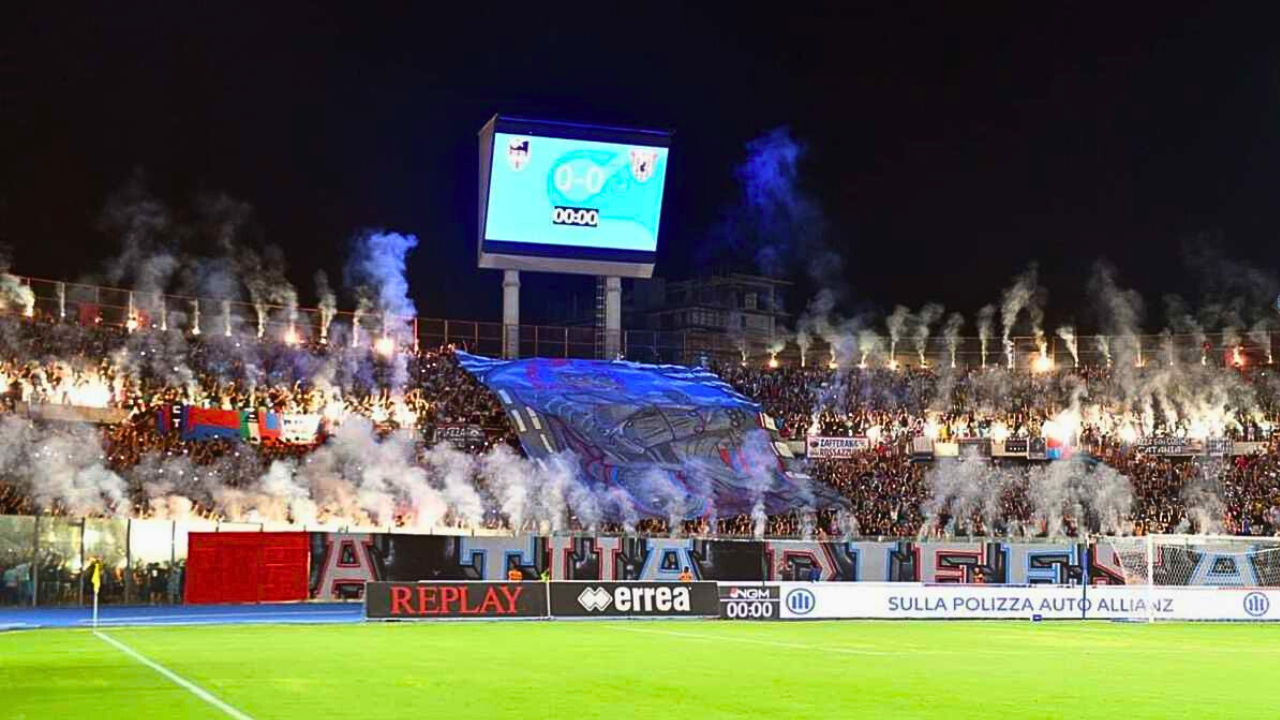
He is aiming to make it a sixth with Catania. “We have a coach who knows how to win, he’s won promotion five times,” Grella states.
“And he knows what it takes to win and what it smells like, and if he doesn’t get the right sensation under his nose, he knows how to make the necessary changes, compared to a coach who has never won [promotion]. This is a very big advantage.”
Catania do have a couple of names that ring out to the calcio purist: Roberto Inglese, once of Parma and Chievo, joined last summer and scored twice in the win over Giugliano. Multiple Scudetto winner Stefano Sturaro is also on the books.
Despite languishing in the third tier, Catania’s average attendance this season is over 16,000, a figure better than all but two of the 20 clubs in Serie B and better than Empoli, Como, Monza, Venezia and Cagliari in the top flight.
Scenes at the Massimino have often gone viral this season, with the Curva Nord often illuminating the Sicilian sky in a flurry of flares and fireworks.
Catania possess a rabid fanbase worthy of Serie A status, but with that comes high expectations.
Things have not gone swimmingly for Toscano and the team this season. This has, of course, lent to a small air of negativity among fans and local journalists, but Grella is not overly concerned.
“It’s very complicated [to manage expectations], because our approach in the first two-and-a-half years, in our relations with the media and with stakeholders in general, has always been respectful and ultra-cautious in not giving false hopes,” he adds.
“Between not giving false hopes and also talking about the bigger plan and the amount of money the Pelligra family has invested in the football club, there’s been no [Catania] president that’s spent even close to this amount of money, and we’re in the third division.
“This is a sign of not only the strength, but the intent of the individual, and why would he spend so much money to stop?”
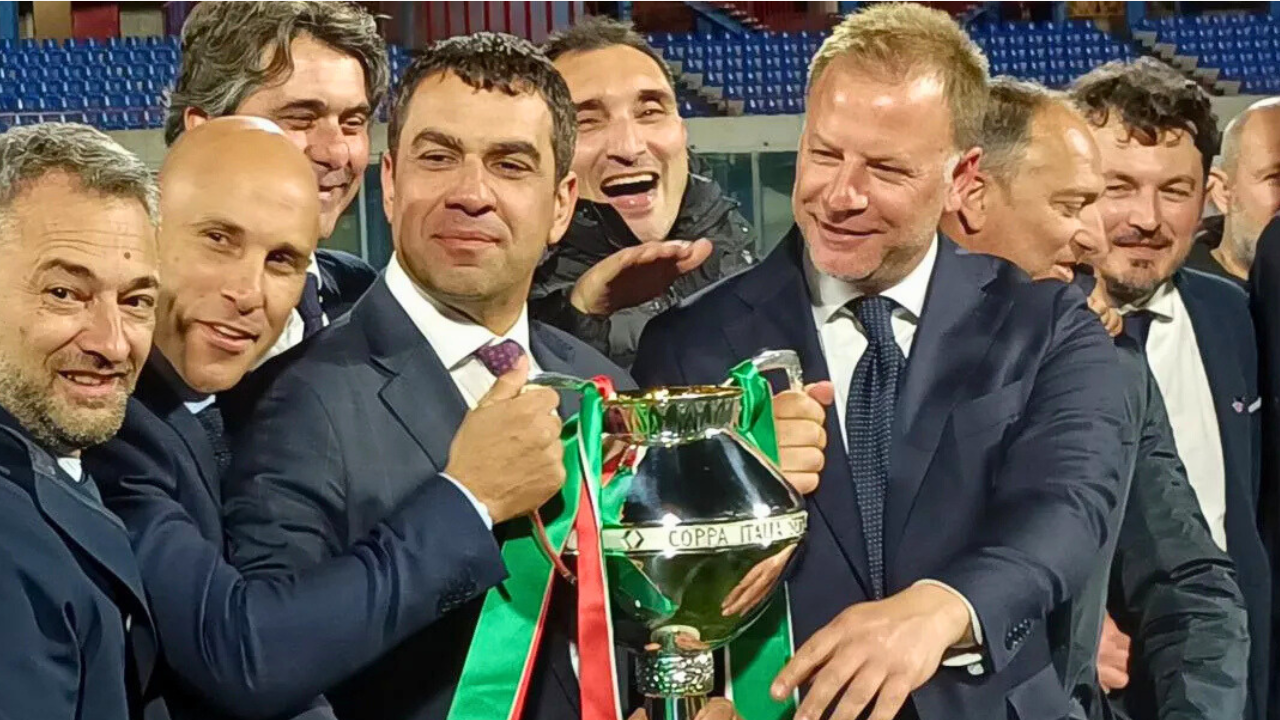
The first piece of silverware was secured last season, when Catania bested Padova in the Coppa Italia Serie C final over two legs.
Fast forward a year and the objective is to get them out of the convoluted quagmire of Serie C and back into Serie B for the first time in a decade.
Grella is not a superstitious man. Yet as Catania continue to go deeper into the play-offs Grella might, for the first time, touch the odd corni – an Italian superstition whereby touching a horn brings good luck and keeps away evil spirits.
“The main thing is we create a good feeling and a good environment,” he says bullishly. “We win together and lose together.”
And given the club’s turbulent history over the past 10 years, they deserve a little luck.
Our time with Grella is up. Politely rejecting a caffe from Catania’s media officer in perfect Italian, Grella gets up, shakes hands and strides out of the office as confident as when he walked in, highlighting why he is tailor-made for the role.
Let’s hope some of his confidence can be transferred to Toscano’s men over the coming weeks.
Related Articles
Related Articles
Football rivalries, world-class sport, surreal carnivals, and a tradition you won’t find anywhere else. Five events to catch in February.
In the latest edition of My Town, My Team, Napoli fan Alex told us why everybody should visit Naples at least once.
Sampdoria against Palermo at the Stadio Luigi Ferraris is just one of the standout matches to be shown live on Destination Calcio TV.


